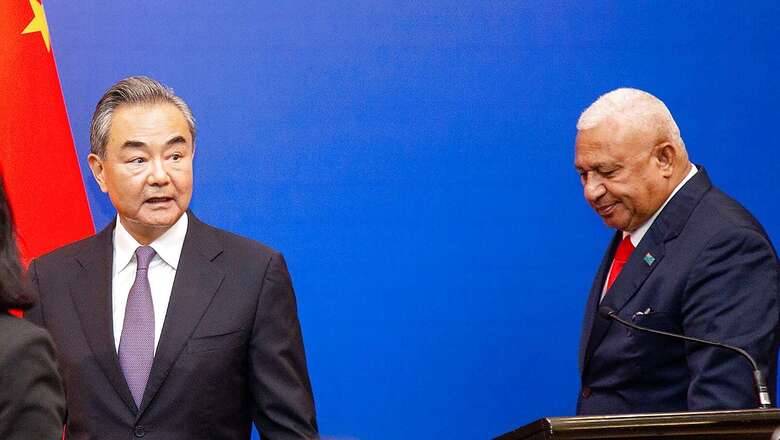
views
In a dramatic turn of events for China, ten Pacific island nations left it high and dry on Monday as they rejected Beijing’s sweeping economic and security pact. China’s Wang Yi had, with much confidence, come to Fiji with a pre-drafted deal, the contents of which were leaked, for the Pacific island nations to sign. He even urged the nations to not be “anxious” or “nervous” and assured them that China would be a “good brother” to them. The Pacific islands, however, made sure that the Chinese foreign minister leaves empty-handed. This marks an end to the free-run that China has been enjoying in the region while the US, which had dropped the ball earlier, makes a comeback.
China’s outreach in the South Pacific region has been speedy and drastic indicating that while the West was busy neglecting the region, China prioritised it for fast gains at the cost of the interests of Taiwan, Australia, France and the US. US Indo-Pacific coordinator Kurt Campbell had anticipated in January this year that the Pacific would host “certain kinds of strategic surprise”. This shows the extent of the void left by the US for China to relish.
In 2019, Taiwan lost Solomon Islands and Kiribati to China as they scrapped their diplomatic ties with Taipei, and established relations with Beijing. China has also bagged various strategically crucial development projects in Pacific island states. Just a month ago, in what came as a huge blow to Australia and the US, China signed a secret comprehensive security pact with the Solomon Islands, a Pacific island nation over 2000 kilometres off the coast of Australia which has spent billions in aid on the Solomon Islands alone is the largest aid donor in the Pacific region. Clueless political bickering followed in Australia where elections were due and the Scott Morrison government was bracing for a brutal drubbing. Eyebrows were raised even at the US which had not just failed to prevent this Pacific disaster but was outright caught napping.
Expensive as it may be, this did serve as a learning lesson. As Beijing’s draft proposal came to light after the President of the Federated States of Micronesia argued that the communique threatened regional stability and trigger a cold war between the West and China, Australia and the United States responded quickly as China prepared to advance the proposal at a virtual meeting with Pacific island nations in Fiji. Australia’s new government led by Prime Minister Anthony Albanese wasted no time in launching a diplomatic charm offensive in the Pacific with foreign minister Penny Wong’s timely visit to Fiji. Also, days after the Indo-Pacific Economic Framework was launched in Tokyo, Fiji joined it to become its 14th member. This was where Beijing’s master plan began to crumble. All eyes were now on Wang Yi’s visit to Suva, which ended in a humbling experience for Beijing.
Also Read: With China Back on USA’s Radar, the Quad is on Track With Renewed Vigour
This, however, is definitely not the end of the road for China in the South Pacific region. It will come back with the same deal and push it more vigourously on the tiny island nations that often suffer a dearth of options to leverage their strategic locations. The tyranny of time and distance and the lack of human resources further scuttle these far-flung nations’ aspirations to connect and do business with the world. Infrastructure development, from highways, airstrips, and bridges to internet connectivity and telecommunication, is key in this scenario and needs heavy foreign investment. The West has just not been around enough to ensure long-term indestructible loyalties in the face of China buying influence under the table and offering tempting heaps of cash in return for a complete strategic takeover.
There was nothing benign about the confidential “pre-determined” proposal presented by Wang Yi. In fact, adorned with rosy language, fails to mask the in-your-face rapacity of the Chinese. Anyone who knows how the Communist Party of China works would spot the catch right away. To begin with, China wants to help build telecom infrastructure which would obviously come with strings attached and crippling dependence. It wants to conduct sensitive marine mapping and seeks access to natural resources on and land as well as water, including fisheries, which happen to be the biggest food source for these island nations. Since overfishing ran China out of fish in its own waters, it has been venturing out into international waters globally, from the South China Sea to the coast of Ecuador. With the same zeal, Beijing has an eye on the potential resources of the vast South Pacific region. In return, China offers billions of dollars in aid and has even dangled the prospect of a China-Pacific Islands Free Trade Agreement which would practically balloon the tiny island nations’ trade deficits with China and not the other way around.
To protect this system of loot, Beijing wants to expand political ties with these nations, in other words, set up Confucius institutes and flood the countries with CCP ideology inducing a natural soft side for China in policy and politique. China also wants to train the local police in these island states and harden them to deal with the sparse population, just in case they wish to resist China’s takeover of their governments and their resources. This new-age Chinese imperialism has been witnessed throughout China’s Belt and Road map and tends to result in debt-trapped economies with secret and not-so-secret Chinese military bases.
For now, China’s over-the-top game plan in the Pacific has been foiled spectacularly as its free run hits a roadblock. But it took an alarming security pact between China and the Solomon Islands, the gradual slipping away of Kiribati and the abandonment of Taiwan by both nations before this, all in a span of three years, for the free world to wake up and make its move. As the Quad returns into action, it must ensure that the IPEF and various other Quad initiatives succeed in cementing stronger ties with ASEAN and Pacific island partners.
Read all the Latest Opinions here



















Comments
0 comment